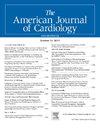急性心力衰竭合并中重度二尖瓣或三尖瓣反流的临床过程和结果:心力衰竭合并房室瓣反流的去充血。
IF 2.1
3区 医学
Q2 CARDIAC & CARDIOVASCULAR SYSTEMS
引用次数: 0
摘要
中度至重度二尖瓣反流(MR)和三尖瓣反流(TR)在心力衰竭住院患者中很常见,并与生活质量差和死亡率增加有关。这些瓣膜病变对院内消血和出院后预后的影响尚不清楚。本研究在DOSE-AHF、ROSE-AHF和CARESS-HF试验中分析了617例因急性HF住院的患者。我们评估了288例无中重度反流患者、221例中重度MR患者和242例中重度TR患者的生物标志物、体格检查结果和症状评分,以评估去充血疗效和结果。对于中度至重度MR患者,与没有中度至重度反流的患者相比,体重减轻、净流失量或肌酐变化没有差异(72小时均p < 0.05)。对于中重度TR患者,体重减轻更多(24小时-4.77磅vs -2.83磅,p = 0.029;与没有中度至重度反流的患者相比,72小时时-9.32磅vs -6.99磅,p = 0.007),净液体损失(-4988mL vs -4581mL, p = 0.008)和肌酐改善(72小时时-0.09 mg/dl vs +0.06 mg/dl, p = 0.002)。在有和没有中度至重度反流的患者中,患者报告的呼吸困难或整体幸福感的变化没有差异(所有:对于出院后的结果,与没有中重度反流的患者相比,中重度MR与出院后60天死亡、再住院或未安排的门诊或急诊就诊增加的无显著趋势相关(48.4% vs 38.2%的患者; = 0.098页)。这种关联在中重度TR患者中并不明显(43.8% vs 38.2%, p = 0.407)。总之,与没有明显反流的患者相比,中度至重度MR患者在医院内经历了相似的缓解充血,但出院后的结果有更差的趋势。中度至重度TR患者的充血明显减少,但这与呼吸困难、总体幸福感或临床结果的渐进式改善无关。本文章由计算机程序翻译,如有差异,请以英文原文为准。
Clinical Course and Outcomes of Acute Heart Failure With Moderate-to-Severe Mitral or Tricuspid Regurgitation
Moderate-to-severe mitral regurgitation (MR) and tricuspid regurgitation (TR) are common in patients hospitalized with heart failure (HF) and have been associated with poor quality of life and increased mortality. The impact of these valve lesions on in-hospital decongestion and postdischarge outcomes is less clear. This study analyzed 617 patients hospitalized for acute HF in the Diuretic Optimization Strategies in Acute Heart Failure (DOSE-AHF), Renal Optimization Strategies Evaluation in Acute Heart Failure (ROSE-AHF), and Cardiorenal Rescue Study in Acute Decompensated Heart Failure (CARESS-HF) trials. We assessed biomarkers, physical examination findings, and symptom scores in 288 patients without moderate-to-severe regurgitation, 221 patients with moderate-to-severe MR, and 242 patients with moderate-to-severe TR to evaluate decongestion efficacy and outcomes. For patients with moderate-to-severe MR, there was no difference in weight loss, net fluid loss, or change in creatinine compared with those without moderate-to-severe regurgitation (all p >0.05 at 72 hours). For patients with moderate-to-severe TR, there was more weight loss (−4.77 vs −2.83 pounds at 24 hours, p = 0.029; −9.32 vs −6.99 pounds at 72 hours, p = 0.007), net fluid loss (−4,988 vs −4,581 ml, p = 0.008), and improvement in creatinine (−0.09 mg/100 ml vs +0.06 mg/100 ml at 72 hours, p = 0.002) than those without moderate-to-severe regurgitation. In those with and without moderate-to-severe regurgitation, there was no difference in the change in patient-reported dyspnea or global well-being (all p >0.05 at 72 or 96 hours). For postdischarge outcomes, compared with patients without moderate-to-severe regurgitation, moderate-to-severe MR was associated with a nonsignificant trend toward increased death, rehospitalization, or unscheduled clinic or emergency department visit 60 days after hospital discharge (48.4% vs 38.2% of patients, p = 0.098). This association was not clearly apparent in patients with moderate-to-severe TR (43.8% vs 38.2%, p = 0.407). In conclusion, patients with moderate-to-severe MR experienced similar in-hospital decongestion compared with those without significant regurgitation but had a trend toward worse postdischarge outcomes. Patients with moderate-to-severe TR experienced significantly more decongestion but this was not associated with incremental improvement in dyspnea, global well-being, or clinical outcomes.
求助全文
通过发布文献求助,成功后即可免费获取论文全文。
去求助
来源期刊

American Journal of Cardiology
医学-心血管系统
CiteScore
4.00
自引率
3.60%
发文量
698
审稿时长
33 days
期刊介绍:
Published 24 times a year, The American Journal of Cardiology® is an independent journal designed for cardiovascular disease specialists and internists with a subspecialty in cardiology throughout the world. AJC is an independent, scientific, peer-reviewed journal of original articles that focus on the practical, clinical approach to the diagnosis and treatment of cardiovascular disease. AJC has one of the fastest acceptance to publication times in Cardiology. Features report on systemic hypertension, methodology, drugs, pacing, arrhythmia, preventive cardiology, congestive heart failure, valvular heart disease, congenital heart disease, and cardiomyopathy. Also included are editorials, readers'' comments, and symposia.
 求助内容:
求助内容: 应助结果提醒方式:
应助结果提醒方式:


